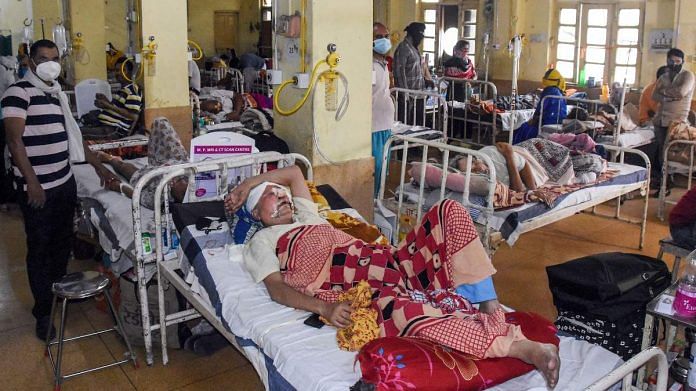New Delhi: Delhi has recorded 498 cases of mucormycosis or black fungus in just four days, prompting the Aam Aadmi Party (AAP) government to declare the disease as an epidemic.
The Delhi government notified the disease late Thursday evening.
According to data with the health department, there were 200 black fungus cases in the city on 23 May, 75 on 24 May, 70 on 25 May and 153 cases on 26 May.
In all, 773 mucormycosis cases have been reported in the past week (ending Thursday).
Mucormycosis is a rare fungal infection and its spread in India is being blamed on, among others, the indiscriminate use of oral steroids in the treatment of Covid-19 patients whose immune systems are compromised. With it now being notified, the government will have to be mandatorily informed about any case that is detected.
The spurt in cases over the past week, has now led to hospitals in the national capital scrambling for Amphotericin B, the key drug used in the treatment of the infection.
A senior Delhi health department official, who didn’t wish to be named, told ThePrint: “We have been receiving not more than 350 vials of Amphotericin B a day, that too only over the past three days, whereas our requirement is now of at least 3,000 vials a day given the number of patients being treated for black fungus in the capital.”
According to senior health department officials, Delhi received 3,850 vials of Amphotericin B as of Tuesday as opposed to the requirement of 30,000 vials a week.
Health Minister Satyender Jain had, however, Wednesday said a third of the patients being treated for black fungus were from outside Delhi.
The shortage had Thursday led to the Delhi High Court urging the central government to consider waiving import duty on Amphotericin B. The HC order came after it was informed that the drug is available in Dubai with individual chemists who are willing to send it to patients in India.
The court was hearing a petition filed by advocate Iqra Khalid, who said her grandfather, Laieq Ahmad Siddiqui, has been battling the black fungus at Sir Ganga Ram Hospital since 18 May.
Also read: You can’t treat severe Covid, black fungus but can prevent risk factor in both — diabetes
Hospitals bear the brunt
The surge in the black fungus cases has hospitals scrambling for drugs.
Sir Ganga Ram Hospital had 63 patients suffering from black fungus as of Wednesday night. “While two to three get discharged on some days, another 10 come in their place and the spike has been more so since Sunday. It seems to be at its peak right now,” said medical superintendent Dr D.S. Rana.
“Many of these patients are severe and also in the ICU since these patients had Covid anyway and their situation worsened,” he added. So far, four patients have died of black fungus at Ganga Ram.
The hospital received 90 vials of Amphotericin B Tuesday but none Wednesday, leading to anxiety among healthcare workers deputed at the ward for black fungus cases.
“We don’t want a repeat of what happened earlier when people just kept dying and we felt helpless,” said one of the doctors.
The Guru Teg Bahadur (GTB) Hospital had 74 patients suffering from black fungus as of Wednesday, confirmed Dr B.L. Sherwal, medical director, Rajiv Gandhi Super Speciality Hospital, who is also in charge of the facility at GTB.
He also said a ward was being readied at the Rajiv Gandhi hospital for black fungus cases. “We haven’t been able to admit patients yet but hope to do so by Friday,” Dr Sherwal told ThePrint.
The Delhi government has directed GTB, the Rajiv Gandhi Super Speciality Hospital, and the Lok Nayak Jai Prakash (LNJP) Hospital to set up dedicated centres for treatment of black fungus cases.
A doctor deputed at the ward in LNJP confirmed to ThePrint that 55 patients were admitted for treatment of the infection.
“Many of these are also not diabetic. I have been personally monitoring the cases,” the doctor said, adding that from about three patients a day earlier, the hospital was now receiving at least eight patients daily.
Dr Survankar Datta, a junior resident treating black fungus cases at AIIMS Delhi, confirmed that over 50 patients were being treated at the hospital’s trauma centre as well as the main building, while another 50 were undergoing treatment at the Jhajjar branch of the medical institute.
“The irony is that while we are still struggling with getting the medicine (Amphotericin B), patients seem to know where to get it from,” Dr Datta said. “Black marketing or hoarding won’t solve the problem. We need a better system in place.”
(Edited by Arun Prashanth)
Also read: For once, Bihar is fully stocked with black fungus drug. But that’s due to an old failure



